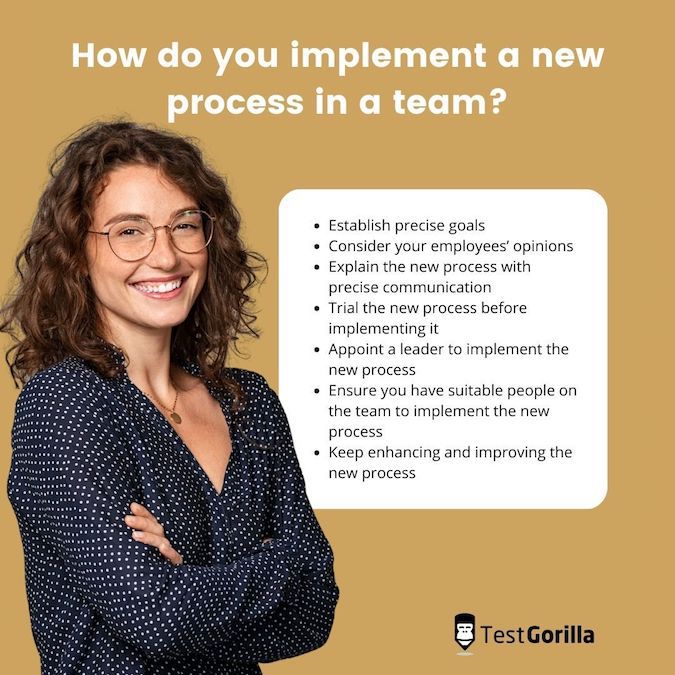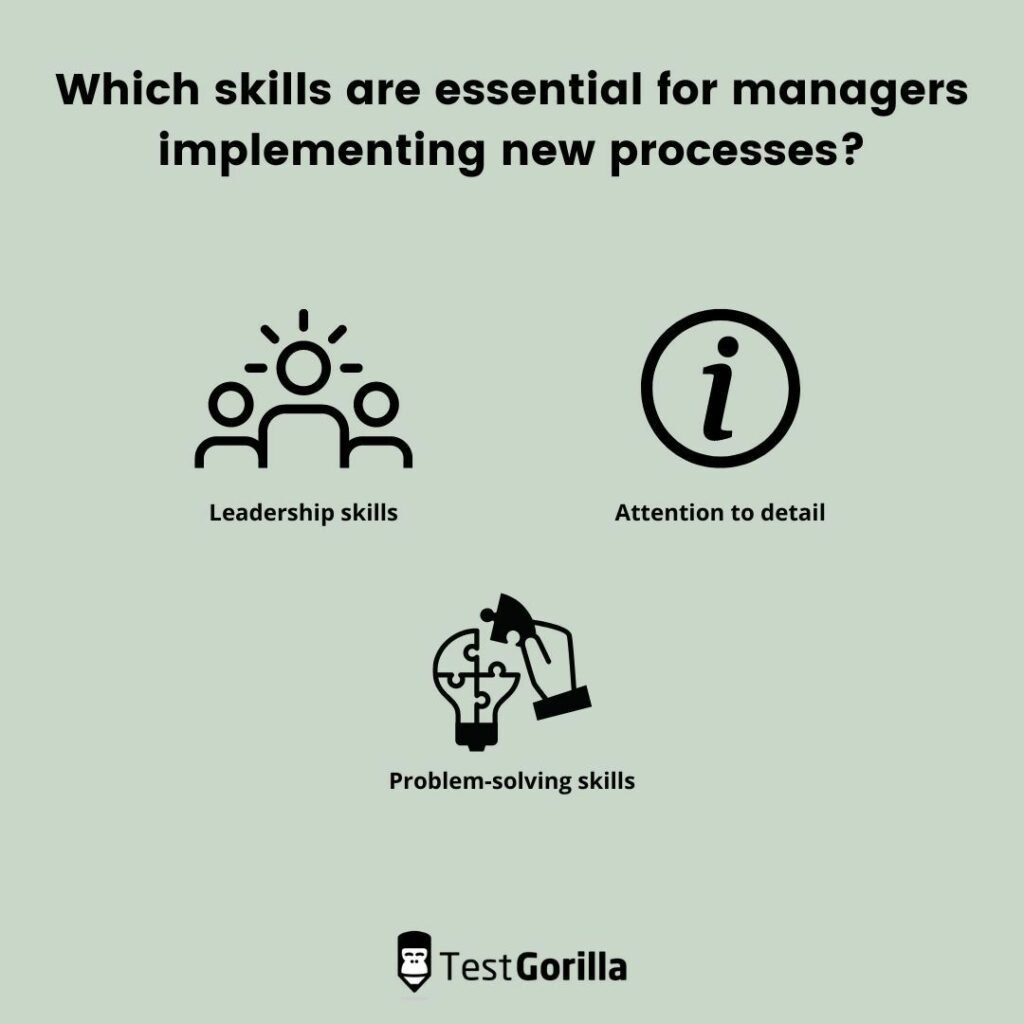Implementing new processes is fundamental for increasing the efficiency of a business’s projects and procedures. But despite the advantages new processes can bring, they can go wrong if you don’t follow the right steps or have the required skills.
If you’re wondering how to implement a new process, this article will help you understand the essential steps you should follow and the skills you need as a manager or HR professional.
Table of contents
What are new processes in a work environment?
A new process at an organization is a new approach that managers, HR professionals, and teams integrate into the business to create extra value or save resources. Such processes are specific to the industry your organization belongs to. And they shape the kinds of tasks your employees will carry out and how they complete them.
What does implementing processes mean, and why is it important?
When we talk about implementing processes in the workplace, we refer to the method managers use to help businesses adopt new procedures, techniques, or practices.
There are many reasons your company may want to implement new processes. From making task management more efficient to reducing mistakes within teams and the wider business to adapting to changes in the market, you and your business can reap many advantages of process implementation.
How do you implement a new process in a team?
It should now be clear that implementing new processes can be beneficial. But how do you go about implementing them in a team?
Check out our seven steps to successfully implement a new process in a team.
1. Establish precise goals
If your business wants to integrate a new process, you must define clear and attainable objectives. Start by specifying the process you want to change and outline why it is crucial.
As part of goal setting and planning, consider whether there are any repetitive tasks your team could streamline to keep costs to a minimum.
2. Consider your employees’ opinions
Even though managers and HR professionals are responsible for making decisions about implementing new processes, it’s critical to consider your employees’ opinions beforehand. Not only does approval from your team help you integrate changes more successfully, but it also increases the chances that they’ll happily embrace the new process.
For instance, if you need to appoint a new team leader to review the team’s work, you might want to check whether your team has any preferences for receiving feedback from the new team lead. Do they prefer written or face-to-face communication? Consult with your team before implementing the new process.
3. Explain the new process with precise communication
Every new process will facilitate the transition in different ways. It’s your job to explain to your team what steps need to be taken, letting them know how the process affects them and what they must do.
For example, if your new process involves gathering feedback from clients and sharing it with a team member to help them improve a project, you should explain each step involved. Is there a required turnaround time? Does the deadline change? Communicate with your team to let them know.
4. Trial the new process before implementing it
To enhance and improve the new process, consider testing it before rolling it out. Select a few individuals from your team and complete a trial of your new process. You can then open it up to the wider team when you’ve seen that it works.
5. Appoint a leader to implement the new process
A manager or leader will have specific skills to implement the new process effectively, helping you oversee the entire plan.
If you need to make a significant decision, deferring to this individual’s opinion can help drive complex new processes faster. A leader can make the final call, but always remember to consult your team members and get their opinions.
6. Ensure you have suitable people on the team to implement the new process
Does your team have the right people to implement a new process? If you are concerned that it doesn’t, you may want to check whether your team has any significant gaps in their knowledge or skills.
Before implementing a new process, ensure that your team has suitable individuals to make it a success. With the right people, your team can work cross-functionally and streamline the workflow.
6. Keep enhancing and improving the new process
Your work will continue even after implementation. If your team is happy with the changes, you will still need to focus on optimizing the new process. Are there any issues or elements of the process that don’t work as efficiently as planned? Do you need to adjust any parts of your plan? Review the new process frequently and adjust it accordingly to perfect it.
Which skills are essential for managers implementing new processes?
Three skills stand out when appointing a manager or leader to execute a new process for your business. Consider whether your leader has the following skills before assigning them this responsibility.
1. Leadership skills
A manager who implements new processes must have leadership skills to make final decisions. They will also need to delegate responsibilities to team members to ensure the new process and workflow works effectively.
However, before handing over control of implementing new processes and procedures, you may need to review your leader’s relevant skills. To assess these skills you can use our Leadership and Management skills test.
2. Attention to detail
As well as leadership skills, managers need to be attentive to details. This skill will make it easier for managers to understand the information that may affect a team before they implement a change. Our Attention to Detail test will help you review these skills and determine who has the best attention to detail when driving forward new processes.
3. Problem-solving skills
Not all new processes work without hitches. A manager should also be able to fix any hiccups that arise with new processes, and this requires expert problem-solving skills. Our Problem Solving test is ideal for determining how well your manager can think strategically when implementing new processes.
Effortlessly execute your new process with a manager who has the right skills
Implementing new processes is a fundamental part of business success. But to do this effectively, you need to ensure you have the right manager with the necessary skills.
Check whether your potential leader has the right skills by using our reliable skills tests at TestGorilla. You can then follow the seven steps in this article to implement your new process quickly. Get started for free today.
Related posts
Hire the best candidates with TestGorilla
Create pre-employment assessments in minutes to screen candidates, save time, and hire the best talent.
Latest posts
The best advice in pre-employment testing, in your inbox.
No spam. Unsubscribe at any time.

Hire the best. No bias. No stress.
Our screening tests identify the best candidates and make your hiring decisions faster, easier, and bias-free.
Free resources
This checklist covers key features you should look for when choosing a skills testing platform
This resource will help you develop an onboarding checklist for new hires.
How to assess your candidates' attention to detail.
Learn how to get human resources certified through HRCI or SHRM.
Learn how you can improve the level of talent at your company.
Learn how CapitalT reduced hiring bias with online skills assessments.
Learn how to make the resume process more efficient and more effective.
Improve your hiring strategy with these 7 critical recruitment metrics.
Learn how Sukhi decreased time spent reviewing resumes by 83%!
Hire more efficiently with these hacks that 99% of recruiters aren't using.
Make a business case for diversity and inclusion initiatives with this data.





















